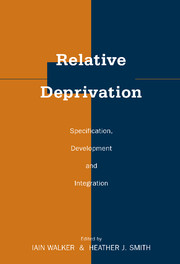Book contents
- Frontmatter
- Contents
- List of Contributors
- 1 Fifty Years of Relative Deprivation Research
- PART ONE SPECIFICATION
- 2 Fraternal Deprivation, Collective Threat, and Racial Resentment: Perspective on White Racism
- 3 Understanding the Nature of Fraternalistic Deprivation: Does Group-based Deprivation Involve Fair Outcomes or Fair Treatment?
- 4 Relative Deprivation and Intergroup Attitudes: South Africa before and after the Transition
- 5 Is It Just Me?: The Different Consequences of Personal and Group Relative Deprivation
- PART TWO DEVELOPMENT
- PART THREE INTEGRATION
- Part Four Conclusion
- Index
5 - Is It Just Me?: The Different Consequences of Personal and Group Relative Deprivation
Published online by Cambridge University Press: 29 September 2009
- Frontmatter
- Contents
- List of Contributors
- 1 Fifty Years of Relative Deprivation Research
- PART ONE SPECIFICATION
- 2 Fraternal Deprivation, Collective Threat, and Racial Resentment: Perspective on White Racism
- 3 Understanding the Nature of Fraternalistic Deprivation: Does Group-based Deprivation Involve Fair Outcomes or Fair Treatment?
- 4 Relative Deprivation and Intergroup Attitudes: South Africa before and after the Transition
- 5 Is It Just Me?: The Different Consequences of Personal and Group Relative Deprivation
- PART TWO DEVELOPMENT
- PART THREE INTEGRATION
- Part Four Conclusion
- Index
Summary
Two professors discover that their salary is significantly lower than the salaries for faculty members at institutions with less stringent job requirements. One professor immediately joins the faculty union and actively participates in rallies and strike actions. The other professor redoubles her efforts to receive grants and merit pay. Why might these professors react so differently to the same disadvantage? According to relative deprivation theory, the same disadvantage framed in different ways will lead to different reactions. If the professor views herself as a representative faculty member deprived in comparison to faculty at other institutions (group relative deprivation), she should be motivated to support collective action. However, if the professor views herself as a unique individual deprived in comparison to other individual faculty (personal relative deprivation), she should be motivated to pursue individualistic opportunities.
Unfortunately, the initial promise of relative deprivation (RD) as an explanation for collective behavior has not been fulfilled. Some investigations strongly support RD models (e.g., Abrams, 1990; Pettigrew, 1978; Runciman, 1966; Vanneman & Pettigrew, 1972; Walker & Mann, 1987), but others do not (e.g., Gaskell & Smith, 1984; Thompson, 1989). In response to these inconsistencies, previous literature reviews have sought to clarify the theoretical antecedents and components of the concept (Crosby, 1976; Martin, 1986; Walker & Pettigrew, 1984), or to dismiss its value completely (e.g., Finkel & Rule, 1986; Gurney & Tierney, 1982). However, dismissing the usefulness of RD may be premature.
- Type
- Chapter
- Information
- Relative DeprivationSpecification, Development, and Integration, pp. 91 - 116Publisher: Cambridge University PressPrint publication year: 2001
- 19
- Cited by



